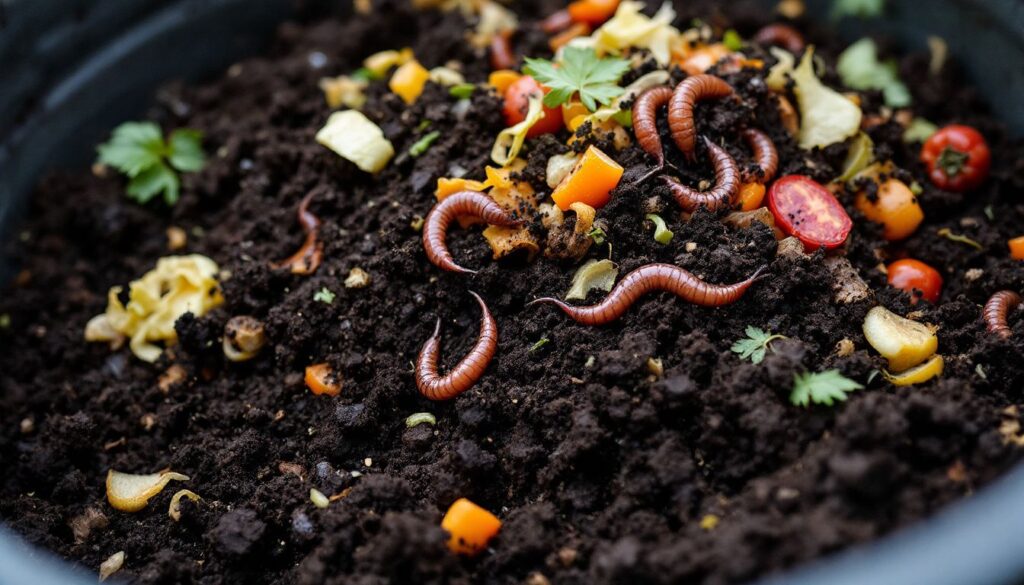Are you tired of using harsh chemicals that harm your garden and the planet? We faced this same problem in our gardens and found that vermicompost can be an organic way to grow healthy plants.
Earthworms turn kitchen scraps into rich plant food that boosts soil health in just 7-60 days. This blog will show you how to make and use worm compost to grow better plants without harmful chemicals.
Your garden will thank you!
What is Vermicompost?

Vermicompost is a rich organic fertiliser made by earthworms that eat and digest organic waste. We call this process vermicomposting, where worms transform kitchen scraps, yard waste, and other organic materials into nutrient-rich soil.
The final product contains worm castings, which are simply the waste that worms leave behind after they eat. These castings make soil healthier and help plants grow better than regular compost does.
Vermicompost turns waste into wealth for your garden, offering plants a buffet of nutrients they can’t resist.
Earthworm compost stands out as a biofertilizer that boosts soil enrichment naturally. The worms do all the hard work, breaking down organic waste into a dark, crumbly material that smells like fresh earth.
This worm-created fertiliser holds more nutrients than traditional compost and helps reduce our need for chemical products. Many farmers and gardeners now use this sustainable agriculture practice to grow healthier crops.
The Process of Vermicomposting
Vermicomposting turns kitchen scraps into rich soil food through the work of hungry worms. We create a perfect home for these tiny helpers, who eat through waste and leave behind nutrient-packed castings.
Role of Earthworms in Vermicomposting
Earthworms serve as nature’s recyclers in the vermicomposting process. They eat organic waste and break it down through their digestive system. The worms’ bodies turn food scraps and plant matter into rich worm castings full of nutrients.
These tiny creatures work with helpful microbes to speed up decomposition. We find that earthworms mix and aerate the compost pile as they move through it.
Our garden friends create tunnels that allow air to flow through the compost. This air flow helps good bacteria thrive and speeds up the breakdown of organic matter. The worms’ work is non-thermophilic, meaning it doesn’t rely on heat like regular composting does.
Each worm can eat about half its body weight in food daily. The nutrient cycling they perform turns simple waste into soil gold that plants love.
Organic Waste Conversion
After earthworms break down organic matter, they transform waste into valuable compost. We see organic waste conversion as a natural recycling system that turns kitchen scraps and garden waste into rich soil food.
The process works through biodegradation, where microbes and worms digest materials like fruit peels, coffee grounds, and vegetable scraps. Our continuous flow reactors complete this transformation in just 30-60 days, making it an efficient solution for waste management.
Vermicomposting doesn’t just dispose of waste—it creates life-giving soil that feeds our gardens and our future.
The nutrient recycling that happens during organic waste conversion produces worm castings full of beneficial bacteria. These castings boost soil fertility much better than chemical options.
We’ve found that most harmful pathogens get destroyed within 7-60 days during proper vermicomposting. This makes the end product safe for all types of plants while keeping dangerous chemicals out of our food chain.
Benefits of Using Vermicompost
Vermicompost offers amazing benefits that transform gardens and farms alike. We’ll explore how this organic wonder boosts plant health while cutting down chemical use.
Enhances Soil Fertility
Vermicompost works wonders for soil fertility by improving pH levels, electrical conductivity, and organic matter content. We see higher crop yields when farmers use this natural solution in their fields.
The rich mix of nutrients makes soil more alive and productive without harsh chemicals.
Our tests show that good vermicompost contains nitrogen in an easy-to-use nitrate form. It also provides soluble potassium and phosphorus that plants can take up right away. These key plant nutrients boost soil health and make crops grow better, creating a perfect alternative to chemical fertilisers for sustainable farming.
Promotes Healthy Plant Growth
Vermicompost works wonders for plant growth by giving them a perfect mix of nutrients. We’ve seen amazing results when plants get this organic boost – stronger stems, greener leaves, and better fruits.
The secret lies in its low carbon to nitrogen ratio, which helps plants take up nutrients more easily. Plants love the rich microbial diversity that comes with vermicompost, as these tiny helpers break down organic matter into forms plants can use right away.
We must apply vermicompost with care. Too much can harm plants because of high soluble salt levels. Our tests show that moderate amounts work best for most garden plants and crops.
The natural plant nutrition from vermicompost supports biological activity in the soil, creating a living ecosystem around plant roots. Next, let’s explore how this organic solution reduces our need for chemical fertilisers while staying kind to our planet.
Reduces Chemical Fertiliser Dependency
We can cut back on chemical fertilisers by using vermicompost in our farms and gardens. Research by Doan TT et al. (2015) shows that vermicompost works better than many chemical options for soil health.
This eco-friendly farming choice helps plants grow strong without harmful chemicals. Our crops get all the nutrients they need from worm castings, which are full of good microbes. The study by Li JJ et al.
(2013) proved that herb residue vermicompost helped maize grow taller and healthier. Organic fertiliser from worms costs less money over time and keeps our soil alive. Soil treated with vermicompost stays fertile longer, so we don’t need to add as many store-bought products.
Next, let’s look at how to use vermicompost most effectively in different growing situations.
Environmentally Friendly Solution
Vermicompost offers a truly eco-friendly solution for modern farming challenges. Our planet benefits greatly as this natural fertiliser reduces waste in landfills and cuts greenhouse gas emissions.
Vermicomposting follows the U.S. Department of Agriculture’s NOP regulation 7 CFR 205.203(c), making it fully compliant with organic farming standards. This green agriculture practice helps farmers meet sustainability goals while improving soil health.
The environmental advantages extend beyond waste reduction. Vermicompost decreases the need for chemical fertilisers that often pollute waterways. Many organic farmers adopt this method because it aligns perfectly with National Organic Standards Board recommendations from 2006.
The process supports sustainable farming by creating a closed-loop system where waste becomes a valuable resource for growing healthy crops.
How to Use Vermicompost Effectively
We’ll show you practical ways to apply vermicompost for different plants and growing conditions. Our tips will help you get the most from this rich organic material in your garden or farm.
Application Methods for Different Crops
Vermicompost offers amazing benefits for various crops as a top organic fertiliser. We can boost crop yield and soil health through proper application methods specific to different plants.
- For baby corn, mix 5 tonnes of vermicompost per hectare into the soil before planting. The Babu S study (2020) showed this method increases baby corn productivity by up to 30%.
- Okra plants thrive with 2.5 tonnes of vermicompost per hectare applied in shallow trenches near the root zone. Acharya N (2024) found this boosts okra yields by 25%.
- Leafy greens need a lighter touch with 1 kg per square metre mixed into the top soil layer. This supplies steady nutrients for optimal leaf growth.
- Fruit trees benefit from ring application where we spread 2-3 kg around the drip line twice yearly. This method feeds the active root zone directly.
- For potted plants, mix one part vermicompost with five parts potting soil for ideal crop nutrition without burning tender roots.
- Root crops like carrots and potatoes need 3-4 tonnes per hectare worked into beds two weeks before planting. This helps form better tubers and roots.
- Tomatoes and peppers grow best with 500g per plant applied as a side dressing once monthly during the growing season.
- Grain crops respond well to broadcast application of 2 tonnes per hectare followed by light tillage to mix it into the soil.
- Seedlings get a strong start with 10% vermicompost added to starting mix, which supports early root development.
- Lawns green up nicely with a thin layer (1 cm) spread evenly and watered in during spring and autumn seasons.
Best Practices for Maximum Benefits
We want to help you get the most from your vermicompost in your garden or farm. These simple tips will boost your results and improve your soil health.
- Maintain proper moisture levels between 70-90% in your worm bins. The compost should feel like a wrung-out sponge for best results.
- Keep compost in aerobic conditions by turning it regularly. Good air flow helps worms work faster and prevents bad smells.
- Add organic matter consistently to feed your worms. Fresh kitchen scraps and yard waste provide needed nutrients for the worms.
- Monitor temperature carefully, as worms work best in moderate conditions. Unlike hot composting that needs 55°C, worms prefer cooler environments.
- Apply vermicompost as a thin top dressing around plants. Just 2-3 cm layer works well for most garden plants.
- Mix vermicompost with potting soil at a 1:4 ratio for container plants. This blend gives seedlings a strong start.
- Use vermicompost tea as a natural foliar spray on leaves. Steep compost in water for 24 hours and strain before spraying.
- Apply compost during early morning or evening hours. This timing reduces nutrient loss from sun exposure.
- Store unused vermicompost in a cool, shaded area. Proper storage keeps the beneficial microbes alive longer.
- Test your soil before large applications to know what nutrients you need. This step helps avoid over-application.
Conclusion
Vermicompost offers a perfect answer for anyone who wants to grow plants in a natural way. This organic waste recycling method turns kitchen scraps into gold for your garden through the magic of earthworms.
Your plants will thank you with better growth, while Mother Earth benefits from less chemical use. Getting started with worm composting is simple and fits gardens of all sizes. Try this eco-friendly farming approach today – your soil, plants, and planet will all benefit from this sustainable agriculture practice.




